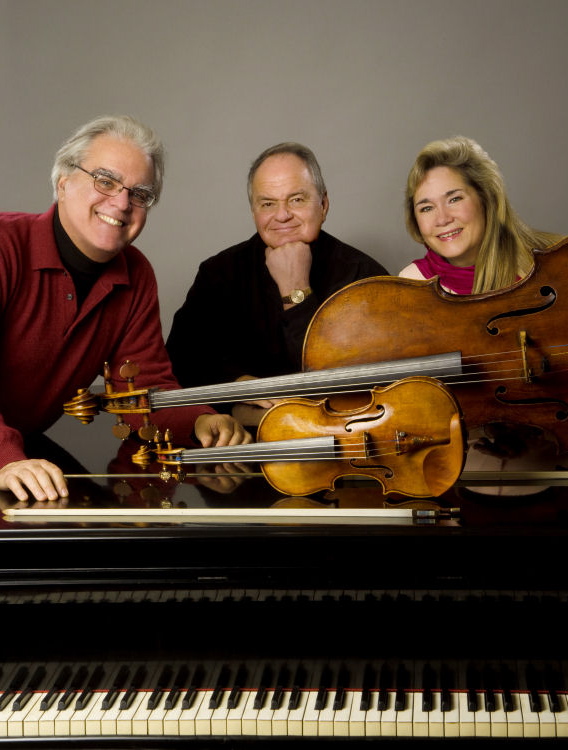KLR Trio bridges three centuries of music with a tour de force performance at Mandel Hall

The Kalichstein Laredo Robinson Trio is in the enviable position of having performed for over three and a half decades now with the luxury of its original personnel intact.
That longevity is not only a tribute to the individual musicianship of its members–pianist Joseph Kalichstein, violinist Jamie Laredo and cellist Sharon Robinson–but also to the extraordinary chemistry that these performers inhabit as a unit, which is far more than the sum of its parts.
Friday evening’s performance on the University of Chicago Presents series at Mandel Hall was as varied a program as possible on a three-work program, including music from the 18th, 19th and 21st centuries.
The Mozart Trio in B-flat Major, K. 502 that opened the program was given a muscular, take-no-prisoners approach that would seem more at home in Beethoven, with lots of rubato, sluggish tempos and emphasis on string vibrato. And yet, surprisingly, there was nonetheless plenty of charm and nuance that made these choices seem organic.
André Previn’s Piano Trio No. 2 was a work commissioned by KLR and premiered last May at Lincoln Center, here given its Chicago premiere. The twenty-minute, three-movement work is every bit as eclectic as Previn himself, who has encompassed the various roles of a Hollywood film composer and arranger, jazz pianist, symphonic conductor and contemporary music composer over his long career.
Happily, the Second Trio celebrates all of these aspects of Previn’s art. The work is surprisingly chromatic, sometimes flirting on the edge of tonality but always resolving diatonically.
The ideas are fast and furious, rarely lingering, and moving from Ivesian tone-clusters in the upper piano register to overtly sentimental violin lines that have traces of Bartók and Shostakovich. Scriabin-like piano musings morph into advanced harmonic bebop, sometimes with the strings used percussively.
What is refreshing about the piece is that while authentically dwelling within the worlds of contemporary music and the popular idioms of jazz and show music, it mercifully inhabits these worlds without attempting to bridge them via crossover and always with a mischievous sense of humor.
Although Tchaikovsky’s Piano Trio in A minor, Op. 50, is his only foray into the trio form, at fifty minutes, the work is a major statement. Its piano writing is every bit as virtuosic as his piano concertos yet caressed with the intimacy of chamber music.
The piece is tailormade for KLR, a tour de force work for three performers who can really sink their teeth into the music, which KLR did with aplomb.
Particularly memorable was the series of variations on a folk tune that was a favorite of his friend Nikolai Rubenstein, in whose memory the piece had been written. Playing relatively unaltered initially by the piano, soon the piano is playing in a rippling manner in the upper register while the cello plays high and the violin low before the strings go on to decorate the melody in their natural registers. There are permutations that imitate the waltz, the mazurka, Liszt-like pianism, a Bach-like fugue, chromatic and ethereal harmony, and slowed-down statements of the theme giving its usual optimism a sentimental but melancholy character as befits a memorial work.
The interplay between the three performers was extraordinary, each variation given its own character and sound, the contrast among the variations striking and receiving a well-deserved standing ovation at evening’s end.
Posted in Performances


